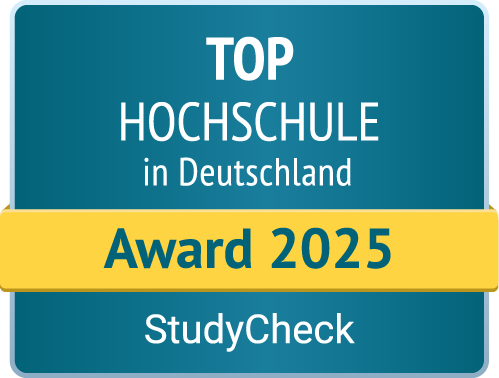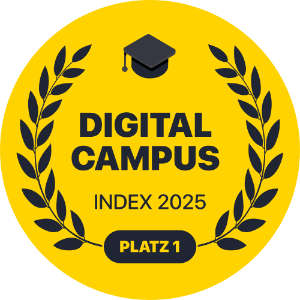Faculty of Engineering
Applied Biotechnology (ABI)

Study overview
Biotech meets management
Todays challenges can no longer be solved without modern biotechnology. For the implementation of biotechnological findings in innovative and sustainable products, it is necessary to closely interlink biotechnological expertise with management skills.
In the Master's programme Applied Biotechnology (ABI), you will combine profound methodological and technical knowledge from biotechnology with management skills. The English-language study programme optimally enables you to take on laboratory and project management responsibilities in biotechnological companies, institutions and authorities.
| Short form | ABI / ABT |
| Type of study | Full time / Part time |
| Standard period of study | 3 semester / 6 semester |
| Award | Master of Science (M.Sc.) |
| Start of studies | Winter semester |
| Admission restrictions | specific |
| Lecture location | Ansbach |
| Language of instruction | English |
| Course management | Prof. Dr.-Ing. Anke Knoblauch |
| Student advisory service | Prof. Dr. Sibylle Gaisser |
| Student Services | studierendenservice.abi(at)hs-ansbach.de |
Study structure
The Master's degree programme in Applied Biotechnology is broadly based and thus opens up career prospects in diverse areas of biotechnology. The programme comprises 90 credit points according to the ECTS (European Credit Transfer System) and is usually completed in three semesters, as a part-time programme in six semesters.
In the first two semesters, key biotechnological competences are taught in the areas of bioprocess engineering, protein purification, applied cell biology, analytics, food product development and bioeconomy and technology assessment. The theoretical and practical knowledge acquired in this way is supplemented by teaching content from the area of management, which depicts the basic skills of a project or laboratory manager in biotechnology. This includes knowledge from the area of regulation and standardisation in the life sciences (Quality Management) as well as the ability to acquire, plan and manage research and industrial projects (Leadership, Research and Management). Electives from the fields of economics, natural sciences or languages allow students to tailor their studies to their individual needs and to broaden or deepen their knowledge.
The Master's thesis is carried out in the third (or fifth and sixth) semester, preferably outside the university as a practice-oriented work in a biotechnological environment.
After successful completion of the programme, the internationally recognised academic degree Master of Science (M.Sc.) is awarded.
Applicants who prove that they have completed a university degree or an equivalent degree for which less than 210 credit points but at least 180 credit points have been awarded, have to acquire the missing 30 credit points from the range of courses offered by the Ansbach University of Applied Sciences within one year after commencing their studies (Art. 90 BayHIG).
Master application from abroad Master applicants with relevant preliminary studies outside of Germany need a VPD from uni-assist and must apply with it in the PRIMUSS applicant portal of University of Applied Science Ansbach.
We recommend to apply as early as possible. You can apply for the VPD at uni-assist before the application period at the University of Applied Sciences Ansbach starts. Please plan to have received your VPD until the end of the appliecation period of our university at the very latest.
Usually uni-assist needs 4 to 6 weeks to work on received requests (complete ones, including payment). Uni-assist informs on current processing times (dependant on region) on their page of uni-assist.de.
Study plan part-time study (example*):

Future prospects
Through the combination of training content from the areas of biotechnology and management, our graduates are optimally prepared to take on laboratory and project management responsibility in companies and institutions in the field of biotechnology. This includes both production and research areas in small to large companies and institutions. Specific fields of activity are, for example, laboratory and project management functions in the areas of research and development, analytics, quality assurance, production as well as sales and marketing.
Staff

Prof. Dr.-Ing. Anke Knoblauch
Studiengangsleiterin (Course Management) Applied Biotechnology (ABI)
Prof. Dr.-Ing. Anke Knoblauch

Studiengangsleiterin (Course Management) Applied Biotechnology (ABI)
Funktionen:
- Professorin Industrielle Biotechnologie (IBT)
- Professorin Applied Biotechnology (ABI)
- Studiengangsleiterin Applied Biotechnology (ABI)
- Professorin Internationales Produkt- und Servicemanagement (IPM)
- Studienfachberatung Internationales Produkt- und Servicemanagement (IPM)
- Vorsitzende Prüfungskommission Internationales Produkt- und Servicemanagement (IPM)
Lehrgebiete:
- Lebensmitteltechnologie
- Funktionelle Lebensmittel
- Product Management
- Food Product Development

Celina Nachtrab
Fakultätsassistentin Fakultät Technik
0981 4877-171 92.2.43 nach Vereinbarung celina.nachtrab vCard
Celina Nachtrab

Fakultätsassistentin Fakultät Technik
Funktionen:
Fakultätsassistentin Fakultät Technik
Betreute Studiengänge:
Applied Biotechnology (ABI)
Biomedizinische Technik (BMT)
Industrielle Biotechnologie (IBT)
Künstliche Intelligenz und Kognitive Systeme (KIK)
Media Systems Engineering (MSE)

Ralph-Peter Kappestein
Leiter Studierendenservice der School of Business and Technology (SBT)
0981 4877-143 BHS 3.02 (Brauhausstraße 15, 91522 Ansbach) nach Vereinbarung ralph-peter.kappestein vCard
Ralph-Peter Kappestein

0981 4877-143
BHS 3.02 (Brauhausstraße 15, 91522 Ansbach)
nach Vereinbarung
ralph-peter.kappestein
vCard
Leiter Studierendenservice der School of Business and Technology (SBT)
Funktionen:
- Leiter Studierendenservice der School of Business and Technology (SBT)

Prof. Dr.-Ing. Heinz Dauth
Professor Applied Biotechnology (ABI)
Prof. Dr.-Ing. Heinz Dauth

Professor Applied Biotechnology (ABI)
Funktionen:
- Professor Industrielle Biotechnologie (IBT)
- Professor Applied Biotechnology (ABI)
Lehrgebiete:
- Unit-Operations in der Verfahrenstechnik (Master EMT)
- Recht und Sicherheit in der Biotechnik
- Verfahrens- und Prozesstechnik
- Grundlagen der Thermodynamik und Strömungslehre
- Werkstoffkunde und Apparatebau
Vita:
- 1987 - 1993: Studium der "Technologie und Biotechnologie der Lebensmittel" (Dipl.-Ing. Univ.) an der TU München
- 1993-1999: Promotion zum Dr.-Ing. an der TU München (Schwerpunkt: Mechanische Verfahrenstechnik)
- 1999-2003: Industrietätigkeit in leitender Funktion
- 2003 - 2011: Wissenschaftlicher Assistent/Mitarbeiter in leitender Funktion am Lehrstuhl für Verfahrenstechnik disperser Systeme der TU München
- 10/2011 – 09/2012: Professor im Fachbereich Chemieingenieurwesen der FH Münster
- seit 10/2012: Professor für Verfahrenstechnik/Ingenieurwesen an der Hochschule Ansbach
Forschungsaktivitäten:
- Ermittlung der Diffusions- und Transportkoeffizienten der Fokker-Planck-Gleichung beim kontinuierlichen Feststoffmischen in Pulvermischungen unterschiedlicher Konzentrationen Finanzierung: DFG DA 1333 / 1-1
>> Projektbeschreibung (externe Seite)
- Untersuchungen zur Propfenentstehung und dynamischen Porositätsänderungen bei der pneumatischen Dichtstromförderung mittels kapazitiver Tomographie (ETC) Finanzierung: DFG So 118/35-1
>> Projektbeschreibung (externe Seite)
Publikationen:
>> Liste der Veröffentlichungen von Prof. Dr.-Ing. Dauth

Prof. Dr. Dirk Fabritius
Professor Applied Biotechnology (ABI)
Prof. Dr. Dirk Fabritius

Professor Applied Biotechnology (ABI)
Funktionen:
- Professor Industrielle Biotechnologie (IBT)
- Professor Applied Biotechnology (ABI)
Lehrgebiete:
- Bioverfahrenstechnik
- Chemie

Prof. Dr. Sibylle Gaisser
Studienfachberatung (Student Advisory Service) Applied Biotechnology (ABI)
0981 4877-304 53.1.4 nach Vereinbarung sibylle.gaisser vCard
Prof. Dr. Sibylle Gaisser

Studienfachberatung (Student Advisory Service) Applied Biotechnology (ABI)
Funktionen:
- Professorin Industrielle Biotechnologie (IBT)
- Studienfachberatung Industrielle Biotechnologie (IBT)
- Professorin Künstliche Intelligenz und Kognitive Systeme (KIK)
- Professorin Applied Biotechnology (ABI)
- Studienfachberatung Applied Biotechnology (ABI)
- Frauenbeauftragte Fakultät Technik
- Musik an der Hochschule
Lehrgebiete:
- Biotechnologie
- Biologie
- Rekombinante Arzneistoffe
- Bioethik
Vita:
- Studium der Technischen Biologie an den Universitäten Stuttgart, Swansea (Großbritannien) und Freiburg
- Promotion in der Pharmazeutischen Fakultät der Eberhard-Karls-Universität Tübingen zum Thema der Antibiotika-BioSynthese und Resistenzmechanismen in Streptomyceten
- Industrie und Forschungstätigkeiten:
- Stellvertretende Geschäftsführerin der Biotechnologie-Agentur Baden-Württemberg
- Senior Scientist und Projektmanagerin am Fraunhofer-Institut für System- und Innovationsforschung, Karlsruhe im Fachbereich "Neue Technologien"
- Weiterbildung und Forschungsaufenthalt zum Thema "Health Technology Assessment" an der Universität Montreal, Kanada - seit 1/2010 Professorin für Biotechnologie und Bioverfahrenstechnik an der Hochschule Ansbach
Forschungsthemen:
- Synthetische Biologie
- Antibiotika-Biosynthese
- Sozioökonomische Analysen und Technikfolgenabschätzung im Bereich der Lebenswissenschaften
Publikationen (Auswahl):
[1] S. Gaisser, T. Reiss (2014): Synthetische Biologie im Spannungsfeld von Forschung, Gesellschaft und Wirtschaft - von der Notwendigkeit eines interdisziplinären und ergebnisoffenen Dialogs. pp. 69 - 90. In "Chancen und Risiken der modernen Biotechnologie". M.Schartl, J.M. Erber.Schropp (Herausgeber). Verlag Springer Fachmedien Wiesbaden
[2] S. Gaisser, T. Reiss (2009): Shaping the science-industry-policy interface in synthetic biology. Systems and Synthetic Biology 2009 Dec;3(1-4):109-14.
[3] S. Gaisser, Reiss T, Lunkes A, Müller KM, Bernauer H. (2009): Making the most of synthetic biology. Strategies for synthetic biology development in Europe. EMBO Rep. 2009 Aug;10 Suppl 1:S5-8.
[4] S. Gaisser, Hopkins MM, Liddell K, Zika E, Ibarreta D. (2009): The phantom menace of gene patents. Nature. 2009 Mar 26;458(7237):407-8.
[5] M. M. Hopkins, D. Ibarreta, S. Gaisser, C,M. Enzing, J. Ryan, P.A. Martin, G. Lewis, S. Detmar, et al.: "Putting pharmacogenetics into practice". Nature Biotechnology 4/2006
[6] Gaisser, S.; Nusser, M.; Reiß, T.: Stärkung des Pharma-Innovationsstandortes Deutschland. Fraunhofer IRB-Verlag (2005), 224 S.
[7] S. Gaisser, A. Trefzer, S. Stockert, A. Kirschning, A. Bechthold: "Cloning of an avilamycin biosynthetic gene cluster from Streptomyces viridochromogenes Tü57". J. Bacteriol. (1997), 179 (20): 6271-6278.

Prof. Dr. Sebastian Künzel
Professor Applied Biotechnology (ABI)
0981 4877-306 53.0.5 Montag 12.00-13.00 Uhr oder nach Vereinbarung sebastian.kuenzel vCard
Prof. Dr. Sebastian Künzel

Professor Applied Biotechnology (ABI)
Funktionen:
- Professor Industrielle Biotechnologie (IBT)
- Studiengangsleitung Industrielle Biotechnologie (IBT)
- Professor Applied Biotechnology (ABI)
- Vorsitzender Prüfungskommission Industrielle Biotechnologie (IBT)
Lehrgebiete:
- Chemie
- Pharmazie

Prof. Dr. Annette Martin
Professorin Applied Biotechnology (ABI)
Prof. Dr. Annette Martin

Professorin Applied Biotechnology (ABI)
Funktionen:
- Professorin Industrielle Biotechnologie (IBT)
- Praktikumsbeauftragte Industrielle Biotechnologie (IBT)
- Professorin Applied Biotechnology (ABI)
- Laborleitung Molekularbiologie
- Projektleitung Gentechnik
Lehrgebiete:
- Molekularbiologie
- Gentechnik
- Bioanalytik
- Zellbiologie und Zellkultur
- Englisch
Vita
- Studium der Biologie an der Albert-Ludwigs-Universität Freiburg
- Promotion am Lehrstuhl für Genetik der Technischen Universität München
Protein-DNA- und Protein-Protein-Interaktionen in der Regulation der Genexpression - Mehrjährige Forschungstätigkeit als Senior Research Scientist bei der Beiersdorf AG Hamburg
- seit 10/2010 Professorin für Molekularbiologie an der Hochschule Ansbach
Forschungsinteresssen
- Nachhaltigkeit im Labor
- Bioanalytische Untersuchung und Bewertung der Zytotoxizität von Konsumgütern
- Lehr-/Lernkonzepte in MINT
Publikationen
Gaisser, S., Knoblauch, A., Martin, A. (2023) Für MINT begeistern – Interesse wecken und Berührungsängste abbauen durch das Ansbacher Modell. Tagungsband zum 5. Symposium zur Hochschullehre in den MINT-Fächern, Nürnberg, 18-24.
Sover, A., Ermster, K., Riess, A. K.-M., Martin, A. (2023) Recycling of Laboratory Plastics Waste - a Feasibility Study on Cell Culture Flasks. In Proc.: 5th International Conference Business Meets Technology. Valencia, 13th-15th July 2023. 67-75. DOI: 10.4995/BMT2023.2023.16729
Hänel, S., Ahlers, M., Martin, A. (2022) Antibiotic-loaded 2D collagen matrices show high biocompatibility with human fibroblasts. Tagungsband 16. ThGOT Thementage Grenz- und Oberflächentechnik und 13. Biomaterial-Kolloquium 14. - 15. Juni 2022, INNOVENT e.V. ISBN 978-3-00-063254-9.
Baumann, T., Bergmann, S., Schmidt-Rose, T., Max, H., Martin, A., Enthaler, B., Terstegen, L., Schweiger, D., Kalbacher, H., Wenck, H., Jedlitschky, G., Jovanovic, Z. (2014) Glutathione-conjugated sulfanylalkanols are substrates for ABCC11 and γ-glutamyl-transferase 1: A potential new pathway for the formation of odorant precursors in the apocrine sweat gland, Exp Dermatol, DOI:10.1111/exd.12354
Martin, A., Hellhammer, J., Hero, T., Max, H., Schult, J. and Terstegen, L. (2011) Effective prevention of stress-induced sweating and axillary malodour formation in teenagers. Int J Cosmetic Sci, 33(1): 90-7
Martin, A., Saathoff, M., Kuhn, F., Max, H., Terstegen, L. and Natsch, A. (2010) A functional ABCC11 allele is essential in the biochemical formation of human axillary odor. J Invest Dermatol 130 (2): 529-40
Wilke, K., Martin, A., Terstegen, L. and Biel, S. S. (2009) Neurobiology of skin appendages: Eccrine, apocrine and apoeccrine sweat glands. Granstein and Luger (Eds) Neuroimmunology of the skin (pp. 167–176), Springer-Verlag Berlin Heidelberg
Wilke, K., Martin, A., Terstegen, L. and Biel, S. S. (2007) A short history of sweat gland biology. Int J Cosmetic Sci 29 (3): 169–179

Dipl.-Ing. (FH) Katja Frohnapfel
Laboringenieurin Applied Biotechnology (ABI)
0981 4877-324 92.1.36 nach Vereinbarung katja.frohnapfel vCard
Dipl.-Ing. (FH) Katja Frohnapfel

Laboringenieurin Applied Biotechnology (ABI)
Funktionen:
- Laboringenieurin Industrielle Biotechnologie (IBT)
- Laboringenieurin Applied Biotechnology (ABI)
Tätigkeitsfelder:
- Molekularbiologie
- Angewandte Bioanalytik
- Zellkultur

Dipl.-Ing. (FH) Katrin Köhl
Laboringenieurin Applied Biotechnology (ABI)
Dipl.-Ing. (FH) Katrin Köhl

Laboringenieurin Applied Biotechnology (ABI)
Funktionen:
- Technische Referentin Fakultät Technik
- Laboringenieurin Industrielle Biotechnologie (IBT)
- Laboringenieurin Applied Biotechnology (ABI)
- Mitglied im Fakultätsrat Technik
Tätigkeitsfelder:
- Bioprocess Engineering
Downstream Processing

Silke Reimann
Biologisch-technische Assistentin Fakultät Technik
Silke Reimann

Biologisch-technische Assistentin Fakultät Technik
Funktionen:
- Biologisch-technische Assistentin Fakultät Technik
Tätigkeitsfelder:
- Biotechnologie
© 2025 Hochschule Ansbach





